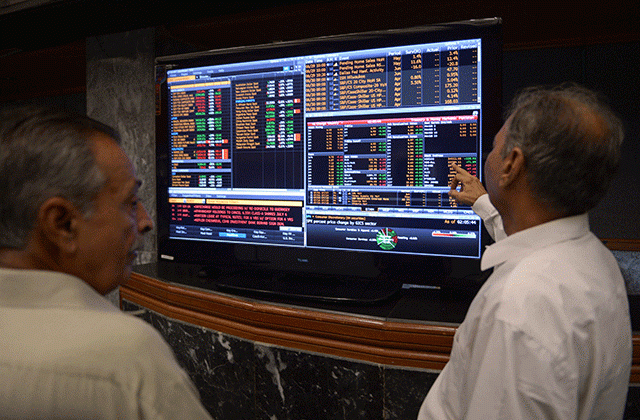Business
‘Not Moving Out Of Bengaluru’: BlackBuck CEO Clarifies After Heated Debate Over ‘Pothole’ Post

Last Updated:
BlackBuck CEO Rajesh Yabaji had earlier announced his decision to move out of its current location at Bellandur on Bengaluru’s Outer Ring Road (ORR) over commute problems.

BlackBuck CEO and co-founder Rajesh Yabaji. (Photo: X/@YABAJI)
Rajesh Yabaji, the co-founder of online trucking platform BlackBuck, clarified that he is not moving out of Bengaluru, after his social media post triggered a heated debate on the IT capital’s infrastructure and traffic issues.
“We unilaterally refute the claims made by some media outlets that we are considering moving out of the city. We are only relocating within the city to a different location, which will facilitate and easy commute for our employees,” he said on X. “As we do this, we want to reiterate that a large part of operations would still continue to happen on the ORR, and hence we will continue to seek help from the concerned authorities to enable infrastructure improvements to facilitate smooth business operations.”
Yabaji said the team moved to Bellandur in 2016 for larger office spaces and better-suited facilities and credited authorities in Karnataka and Bengaluru for providing the company with the needed resources to grow in the city. “As one of the biggest beneficiaries of the Karnataka tech-ecosystem over the last decade, we understand what the city of Bengaluru has helped us achieve and how it will be playing a major role in unlocking our potential ahead.”
“We will not only continue to remain in the city of Bengaluru, but will also expand our footprint here. Bengaluru is home for us and as always, we continue to remain committed to relay our needs and issues to the relevant government authorities and seek support to get them resolved,” he further said.
BlackBuck CEO’s Post & DK Shivakumar’s ‘Blackmail’ Jibe
Earlier, Yabaji on Tuesday announced through a social media post that the company has decided to move out of its current location at Bellandur on Bengaluru’s Outer Ring Road (ORR), citing “worsening infrastructure and commute issues” in the metropolis.
“ORR (Bellandur) has been our “office + home” for the last 9 years. But it’s now very-very hard to continue here. We have decided to move out,” Yabaji said on X, adding that the average commute for colleagues has increased over 1.5 hours and roads are full of potholes and dust.
His remarks caused renewed criticism of Bengaluru’s civic conditions. However, Karnataka Deputy CM DK Shivakumar responded by saying that the government is working to ensure that no company leaves the IT capital over infrastructure-related issues, but “blackmailing the government” will not work. He also said anyone is free to move out if they are not satisfied in Bengaluru.
Andhra Minister Offers Vizag For Relocation
Andhra Pradesh minister and TDP leader Nara Lokesh joined the conversation by offering BlackBuck to relocate to Vizag. “We are rated among top 5 cleanest cities in India, are building best-in-class infra, and have been rated the safest city for women. Please send me a DM,” the Andhra minister said on X.
In another post, Lokesh took a dig by saying that Andhra Pradesh does not dismiss the genuine grievances of people as “blackmail” and instead treats them with dignity and seriousness.

Aveek Banerjee is a Senior Sub Editor at News18. Based in Noida with a Master’s in Global Studies, Aveek has more than three years of experience in digital media and news curation, specialising in international…Read More
Aveek Banerjee is a Senior Sub Editor at News18. Based in Noida with a Master’s in Global Studies, Aveek has more than three years of experience in digital media and news curation, specialising in international… Read More
Click here to add News18 as your preferred news source on Google, News18’s viral page features trending stories, videos, and memes, covering quirky incidents, social media buzz from india and around the world, Also Download the News18 App to stay updated!
September 18, 2025, 19:57 IST
Read More
Business
Ministers asked to take G Ram G to rural India – The Times of India

NDA functionaries, including ministers, would soon hit the ground to explain and create more awareness about benefits of the new rural employment guarantee scheme VB G-RAM-G, which has replaced the UPA-era MNREGA, to negate the opposition’s narrative. This was discussed at Friday’s Cabinet meeting, which PM Modi chaired soon after his foreign trip, sources said.TOI has learnt rural development and agriculture minister Shivraj Singh Chouhan briefed the key provisions of the new scheme to all ministers while urging them to take the message to people. Sources said the PM was also of the similar view for creating more awareness about the new law. Opposition parties may soon carry out protests against the new scheme, particularly for dropping the name of Mahatma Gandhi and increasing burden on the state govts.
Business
Mitsubishi announces $4.4bn Shriram deal – The Times of India

New Delhi: Japan’s Mitsubishi UFJ Financial Group (MUFG) will acquire a 20 per cent in non-bank finance company Shriram Finance (SFL) for $4.4 billion (Rs 39,618 crore), in what is the largest foreign direct investment in the country’s financial services space. MUFG will pick up the minority stake through preferential equity shares, Shriram Finance said in a statement.The Indian financial services outfit will issue 47.1 crore shares at Rs 840.9 each to MUFG Bank through a preferential allotment, it said in a stock exchange filing. MUFG will be able to nominate two directors on the board of Shriram Finance (SFL). The investor will also have a pre-emptive right to subscribe to pro rata shareholding. “These rights shall fall away if the shareholding of the investor in the company falls below 10 per cent on a fully diluted basis,” a press release said. In its edition on Wednesday, TOI had reported about the proposed transaction. “This collaboration combines SFL’s established domestic franchise and extensive distribution network with MUFG Banks’ global expertise and financial strength. The fund infusion will significantly enhance SFL’s capital adequacy, strengthen its balance sheet, and provide long-term growth capital. It will improve access to low-cost liabilities and potentially strengthen SFL’s credit ratings while aligning governance and operational practices with global best standards,” the NBFC said in a statement.
Business
ADB reviews progress on ML-I rail upgradation | The Express Tribune

Ground-breaking of Karachi-Rohri section set for July 2026; upgradation of ML-I urged
The Railways Division submitted the ML-I project summary to ECNEC without arranging finances from the Public Sector Development Programme, China, or any other international financial institution. Photo: AFP
ISLAMABAD:
A delegation of the Asian Development Bank (ADB), led by Director General Leah Gutierrez, on Friday called on Federal Minister for Railways Muhammad Hanif Abbasi to review progress on the upgradation of Main Line-I (ML-I), Pakistan Railways’ most critical infrastructure project.
During the meeting, detailed discussions were held on the scope, financing and implementation strategy of the ML-I upgradation, according to a news release.
Officials briefed the meeting that ML-I serves as the backbone of Pakistan Railways, facilitating nearly 80% of passenger traffic and around 90% of freight movement across the country.
In view of the current condition of railway infrastructure, participants underscored the urgent need to upgrade ML-I to ensure safe, efficient and reliable rail operations.
The project is expected to significantly enhance connectivity, reduce travel time and strengthen Pakistan’s logistics and trade capacity.
Hanif Abbasi described ML-I as a key project for the national economy, saying its modernisation would play a vital role in promoting economic growth, improving regional connectivity and ensuring sustainable transport.
The ADB delegation reaffirmed its continued cooperation and confidence in the progress of the ML-I project and expressed its commitment to supporting Pakistan Railways in its reform and modernisation efforts.
Both sides also agreed that the ground-breaking ceremony of the ML-I Karachi-to-Rohri section would be held in July 2026, marking a major milestone in the execution of the project.
-

 Business6 days ago
Business6 days agoHitting The ‘High Notes’ In Ties: Nepal Set To Lift Ban On Indian Bills Above ₹100
-

 Politics1 week ago
Politics1 week agoTrump launches gold card programme for expedited visas with a $1m price tag
-

 Fashion1 week ago
Fashion1 week agoTommy Hilfiger appoints Sergio Pérez as global menswear ambassador
-

 Sports4 days ago
Sports4 days agoJets defensive lineman rips NFL officials after ejection vs Jaguars
-

 Tech6 days ago
Tech6 days agoFor the First Time, AI Analyzes Language as Well as a Human Expert
-

 Business5 days ago
Business5 days agoKSE-100 index gains 876 points amid cut in policy rate | The Express Tribune
-

 Business5 days ago
Business5 days agoStudying Abroad Is Costly, But Not Impossible: Experts On Smarter Financial Planning
-

 Business1 week ago
Business1 week agoIPO Explained: Meaning, Process, Benefits, Risks





